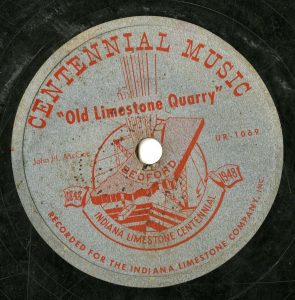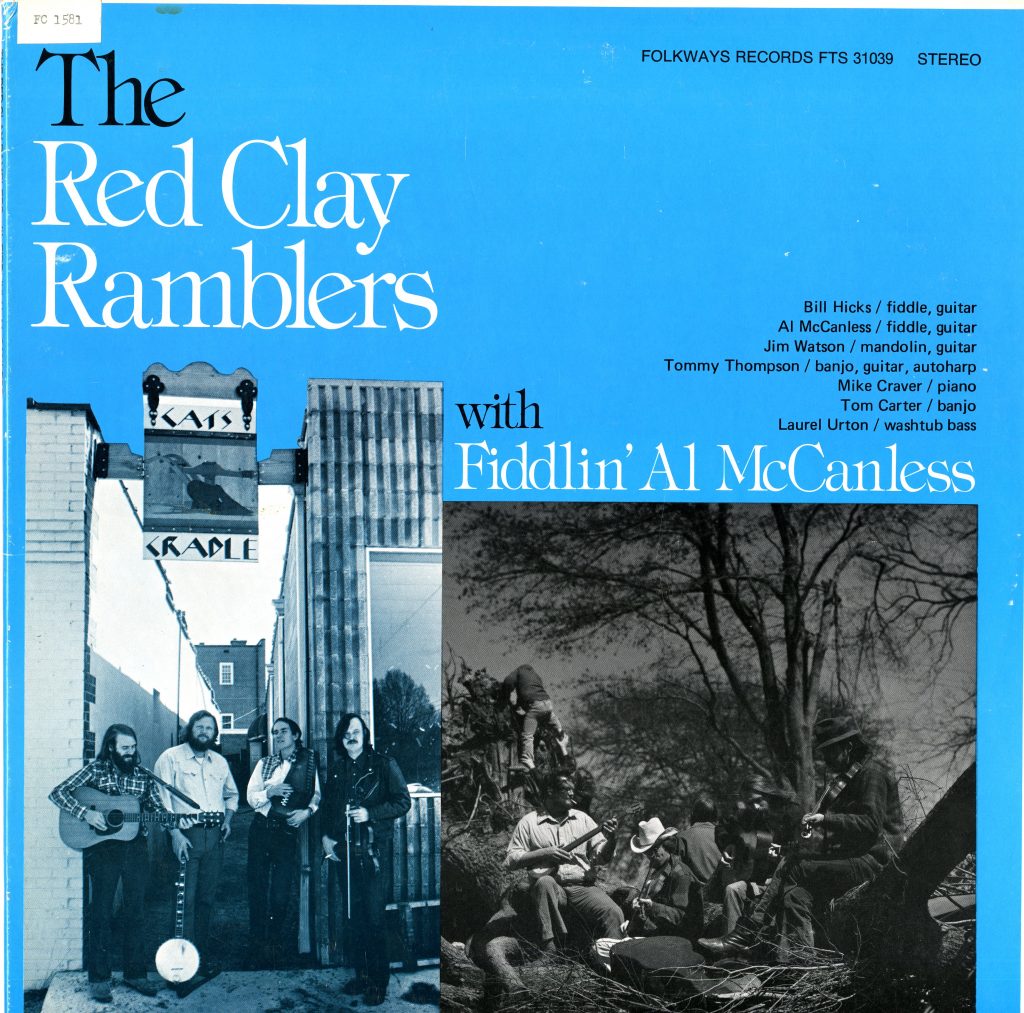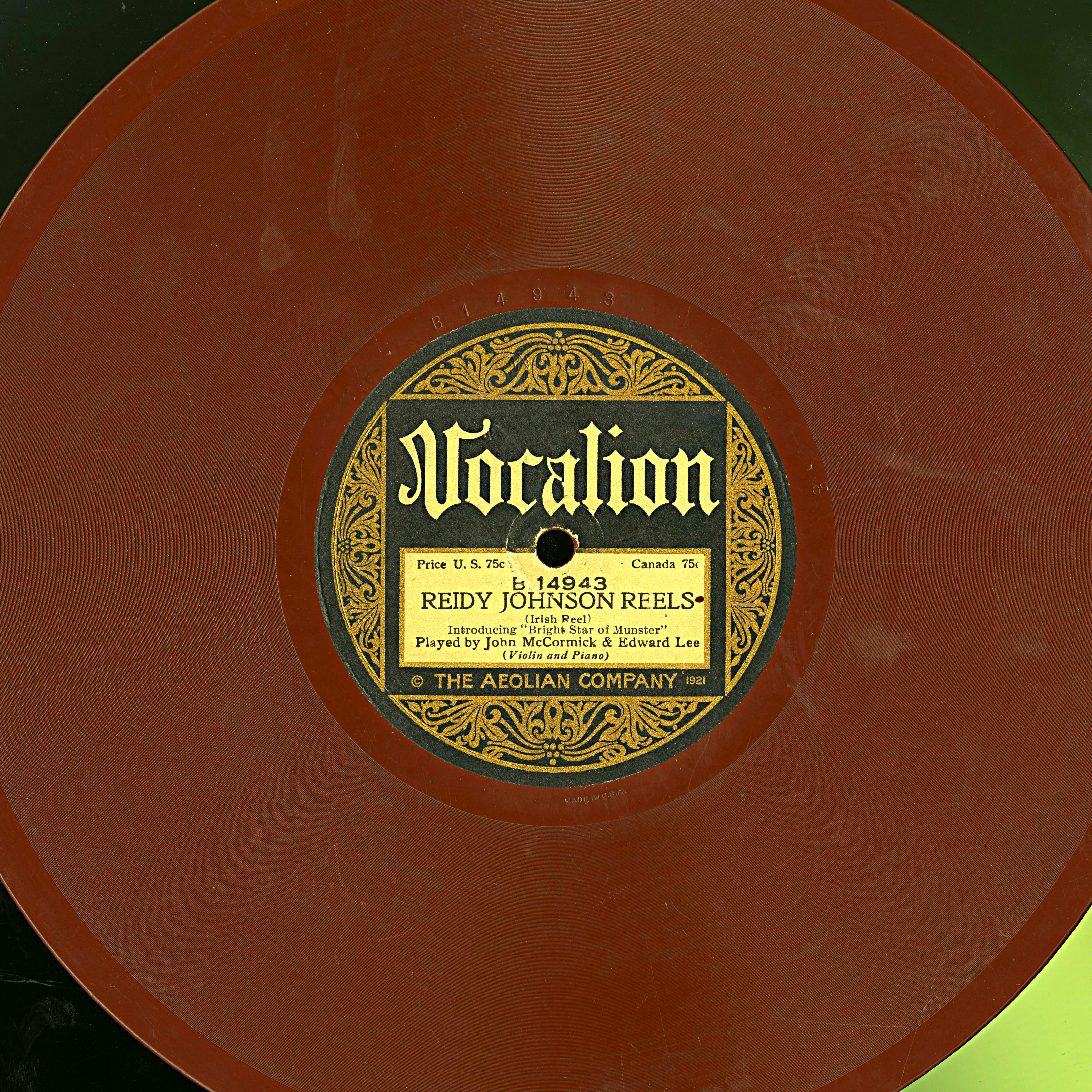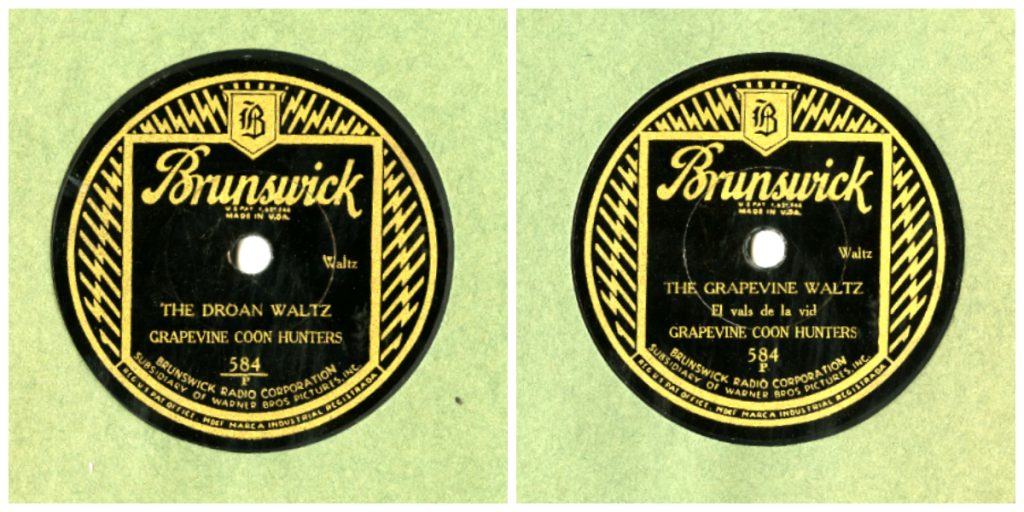 There is not much information about the Grapevine Coon Hunters, a stringband out of Grapevine, Texas that operated in the late 1920s and early 1930s. A research request put us onto a 78 rpm disc released on the Brunswick label in 1932. The disc includes two recordings from a November 1930 recording session in Dallas, Texas, including the mysteriously named “Droan Waltz”
There is not much information about the Grapevine Coon Hunters, a stringband out of Grapevine, Texas that operated in the late 1920s and early 1930s. A research request put us onto a 78 rpm disc released on the Brunswick label in 1932. The disc includes two recordings from a November 1930 recording session in Dallas, Texas, including the mysteriously named “Droan Waltz”
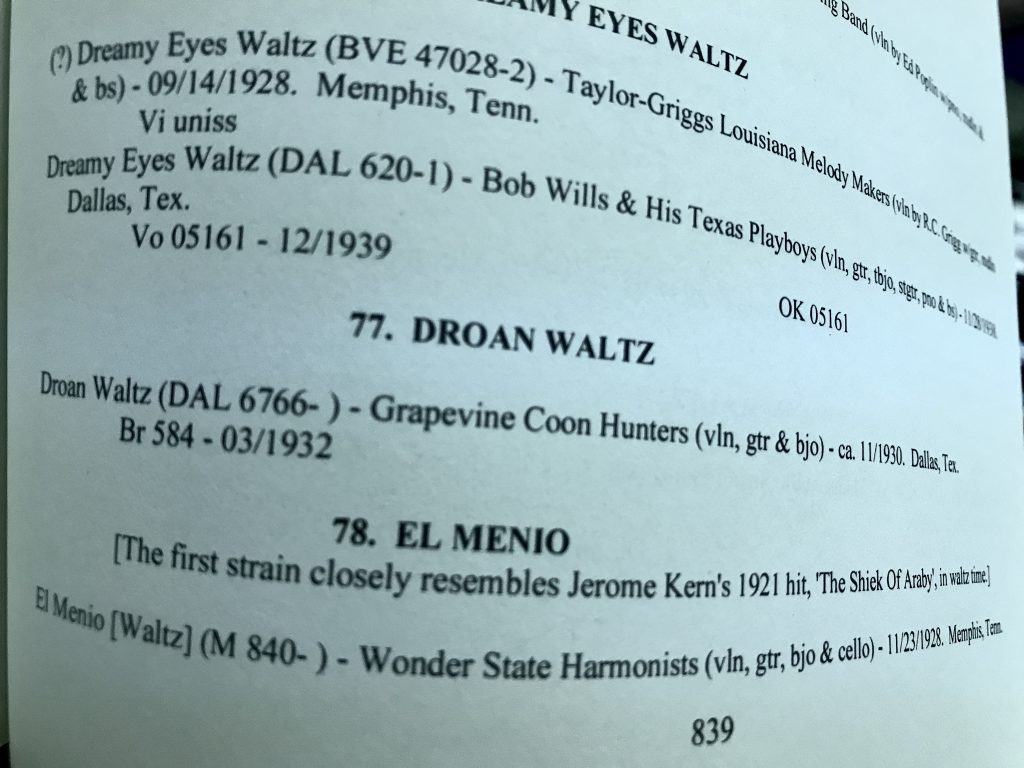 We checked Country Music Sources: A Biblio-Discography of Commercially Recorded Traditional Music by Gus Meade, Douglas Meade, and Dick Spottswood for other recordings, but only came up with this single disc. The recording on the opposite side is “Grapevine Waltz” but the label interestingly includes a Spanish title as well, “El Vals de la Vida.”
We checked Country Music Sources: A Biblio-Discography of Commercially Recorded Traditional Music by Gus Meade, Douglas Meade, and Dick Spottswood for other recordings, but only came up with this single disc. The recording on the opposite side is “Grapevine Waltz” but the label interestingly includes a Spanish title as well, “El Vals de la Vida.”
In folder 457 of the Guthrie T. Meade Collection (20246) we found some handwritten notes about the Grapevine Coon Hunters and another related stringband, The Grapevine Rabbit Twisters. Meade’s notes are citations from local newspapers, The Grapevine Sun and Dallas Morning News, about upcoming radio broadcast appearances and the songs performed on the air. If any readers out there have more information about the Grapevine stringband scene ca. 1930, or if you want to do more research into the Meade Collection, please contact the Southern Folklife Collection or visit at Wilson Library. 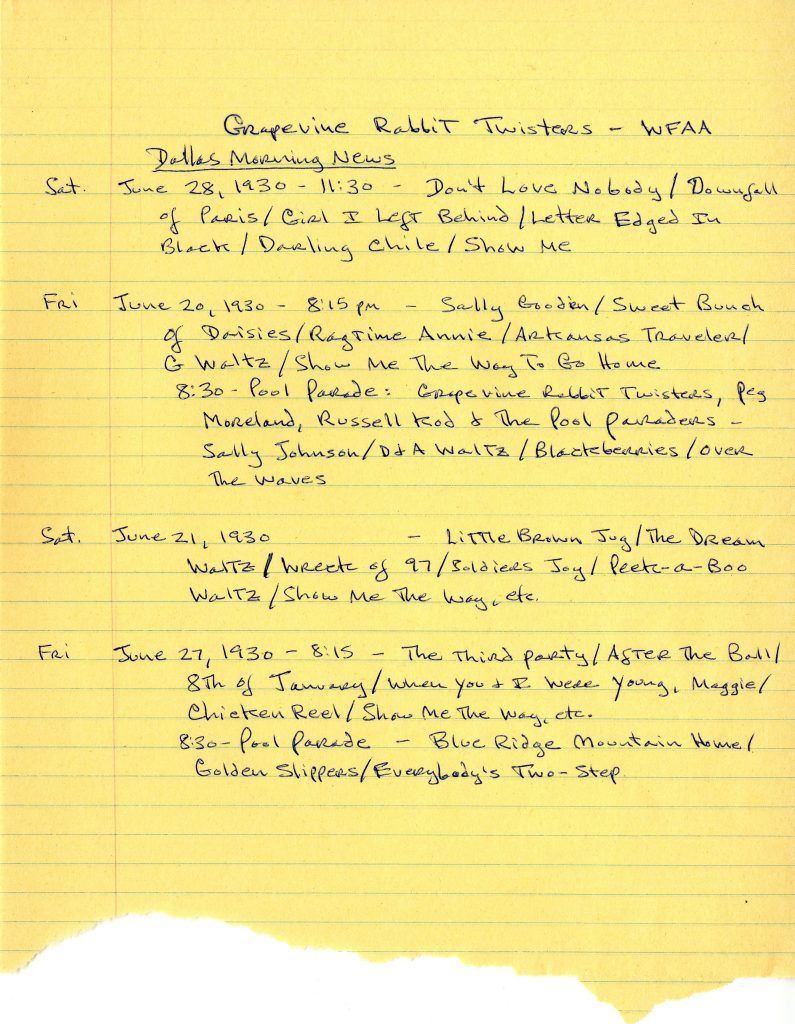
Category: 78 of the week
Brownie McGhee – Blues

Brownie McGhee was a Tennessee-born bluesman (and very briefly an off-broadway actor) who recorded his fingerpicked delta-blues for hallowed labels such as Okeh and Savoy from the early 40’s all the way until his death in 1996. His second album Blues (FC-5898), was released on the short-lived 10-inch, 33 1/3 rpm album format by Folkways Recordings in 1955, and was accompanied by notes written by early influential jazz critic Charles Edward Smith and art by the prolific David Stone Martin
Here’s a snippet from the song “Me and Sonny,” referring to McGhee’s frequent collaborator and North Carolina native Sonny Terry —
Me and Sonny
Record of the week: Red Clay Ramblers with Fiddlin' Al McCanless
left photo, April 1974, Chapel Hill, NC, by Chuck Lewis, l to R: Jim Watson, tommy Thompson, Mike Craver, Bill HIcks; right photo, March 1973, Durham, NC, by John Menapace, L to R: Tommy Thompson, Al McCanless, Jim Watson, Bill Hicks
Thinking about this record this morning, the Red Clay Ramblers’ first, with the Fiddlin’ Al McCanless released in 1974 on Folkways records, FC1581 in the Southern Folklife Collection. Growing out of the Durham old-time music scene previously dominated by the instrumental dance music of the Hollow Rock and Fuzzy Mountain string bands, the early Red Clay Ramblers–Jim Watson, Tommy Thompson, Al McCanless,Bill Hicks, and Mike Craver–looked to experiment more with style, instrumentation and song selection than their predecessors and forged their own “old-timey” sound based on what they wanted to hear.
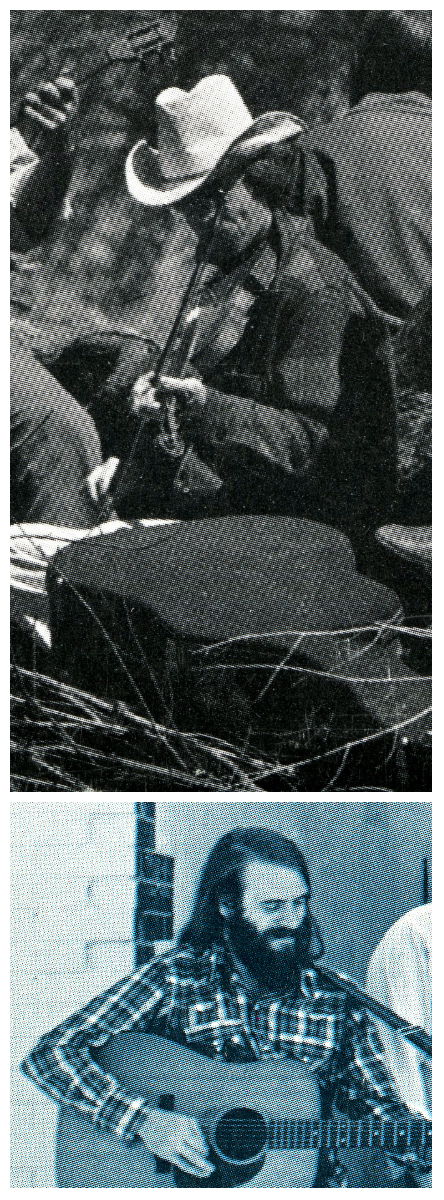 Recorded over 40 years ago, the Ramblers approach to old-time music on this first record still sounds remarkably subversive to me. Not many groups have been able to walk the line between innovation and creative imitation and come out with something that sounds completely their own. We are lucky to have a rare opportunity to hear two of these performers tonight in Chapel Hill. Al McCanless and Jim Watson will be joining together for a set at the same physical location where the photo of the left of the record above was taken, the Nightlight, formerly Cats Cradle.
Recorded over 40 years ago, the Ramblers approach to old-time music on this first record still sounds remarkably subversive to me. Not many groups have been able to walk the line between innovation and creative imitation and come out with something that sounds completely their own. We are lucky to have a rare opportunity to hear two of these performers tonight in Chapel Hill. Al McCanless and Jim Watson will be joining together for a set at the same physical location where the photo of the left of the record above was taken, the Nightlight, formerly Cats Cradle.
Watson and McCanless will be followed by the Down Hill Strugglers, an active band based in Brooklyn who are comitted to a similar aesthetic and approach to performance as the early Red Clay Ramblers, and perhaps a more direct influence, the New Lost City Ramblers (the Down Hill Strugglers have performed and recorded with NLCR founder John Cohen).
Show starts at 8PM tonight at Nightlight. 405 1/2 West Rosemary, Chapel Hill. Fans of old-time music will not want to miss.
78 of the week: Arthur Smith and His Dixie Liners
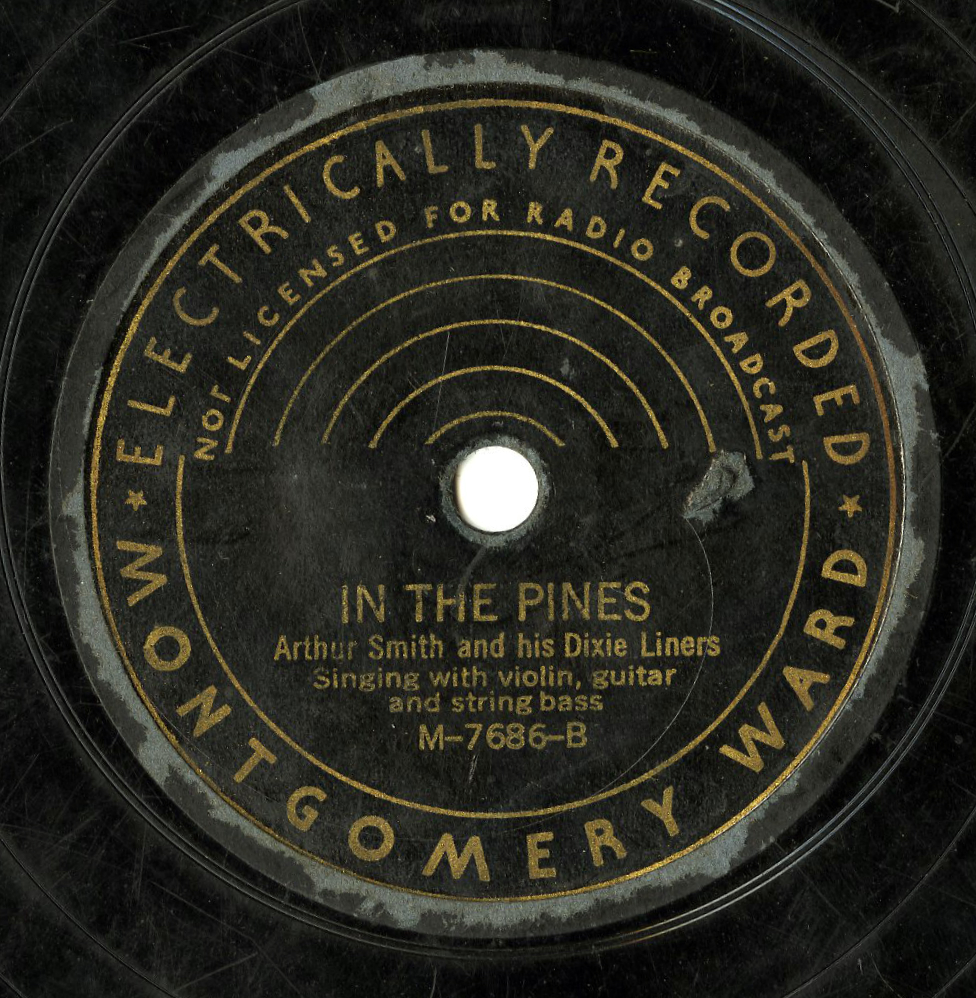
A side from SFC 78 call no. 78-17489 for a rainy Saturday.
78_17489_InThePines_ArthurSmith_SoutherFolklifeCollection
Four Provinces Orchestra: 78 of the week
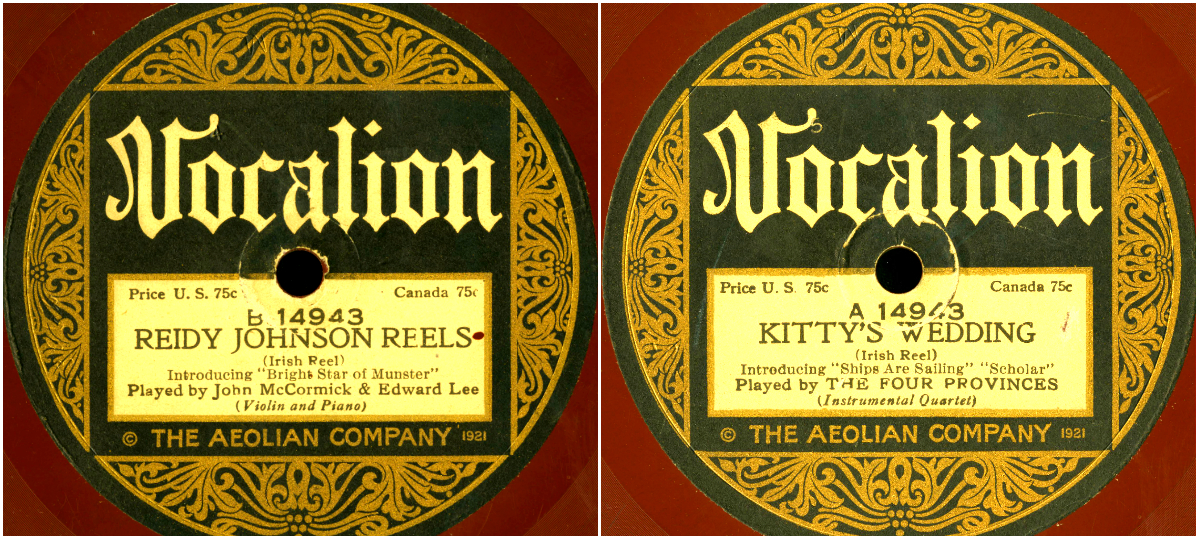
There is more Billy Faier and Thornton Dial coming, I promise. Please do check back, we have been pulling materials from the Billiy Faier Collection (20380) to share with you, but until next week, we thought readers and listeners might enjoy a recording by the great Philadelphia based Irish ensemble, The Four Provinces. The group was founded and led by London-born, Irish pianist Edward Lee. Lee emigrated to the United States in 1916 and quickly put together an ensemble to play the lively Philadelphia dancehall scene, he also co-founded the Irish Musician’s Union (listen to this fascinating recording of Edward Lee’s brother, Joe Lee, at the British Library Sound Archive).
Released in 1924, “Reidy Johnson Reels” and “Kitty’s Wedding”, from 78 rpm disc call number 78-16498 in the UNC Libraries catalog are a wonderful collection of dance tunes. Enjoy a musical pick-me-up on a cold Friday afternoon.
“Reidy Johnson Reels” 78_16498_2_Reidy Johnson Reel
“Kitty’s Wedding” 78_16498_1_Kittys_Wedding
We ain't afraid of no…Happy Halloween from the Southern Folklife Collection
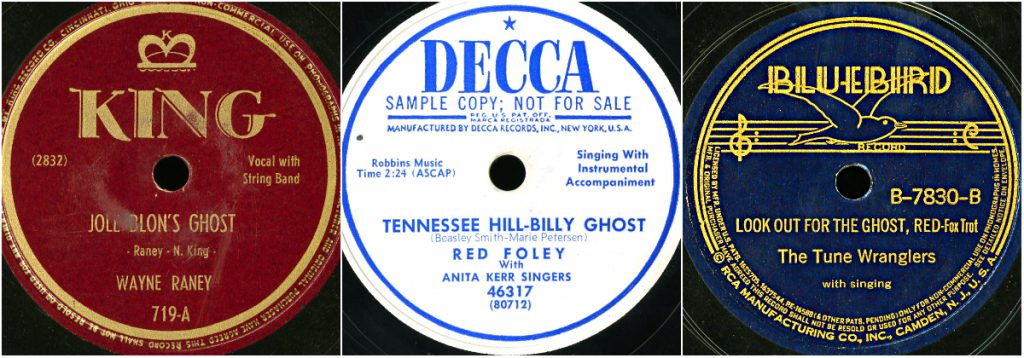 Ghosts, haints, spirits, phantoms, specters, apparitions, poltergeists, phantasms, banshees, you name it, we are ready for you at the Soutehrn Folklife Collection. For your Halloween listening pleasure, we pulled out some of our favorite ghost tunes from our 78 rpm disc collection.
Ghosts, haints, spirits, phantoms, specters, apparitions, poltergeists, phantasms, banshees, you name it, we are ready for you at the Soutehrn Folklife Collection. For your Halloween listening pleasure, we pulled out some of our favorite ghost tunes from our 78 rpm disc collection.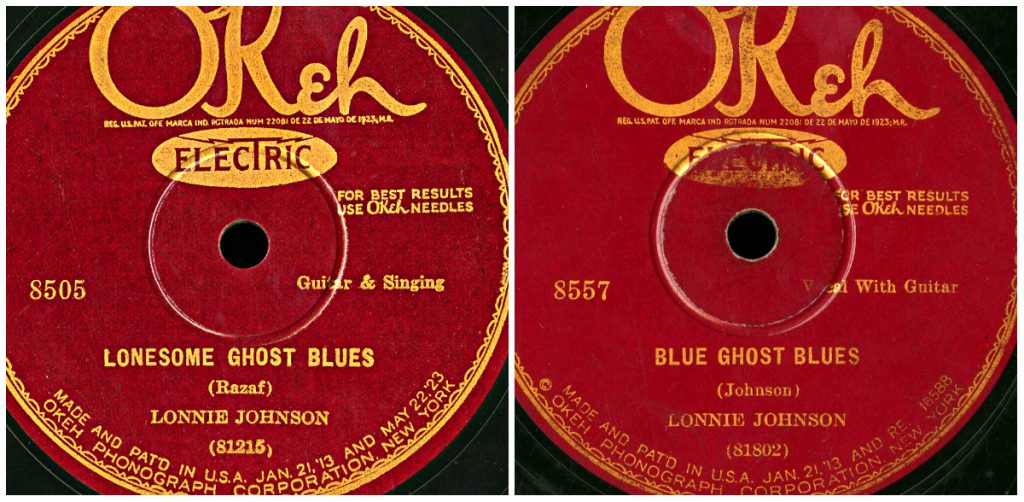
First up, Wayne Raney with “Jolie Blon’s Ghost” from 78-8747, the Tune Wranglers with “Look out for the Ghost, Red” from 78-0949, and the great Red Foley with the Anita Kerr Singers doing “Tennessee Hill-billy Ghost” from 78-3979. But that’s not all, it wouldn’t be Halloween if we didn’t haunt your dreams with Lonnie Johnson’s “Blue Ghost Blues” and “Lonesome Ghost Blues” from 78-10655 and 78-10638.
Wayne Raney:78_8747_1. “Joll Blon’s Ghost,” Wayne Raney, King Record Co., Southern Folklife Collection, Wilson Library, UNC-Chapel Hill
The Tune Wranglers “78_949_2”. “Look Out for the Ghost, Red-Fox Trot,” The Tune Wranglers, Bluebird Records, Southern Folklife Collection, Wilson Library, UNC-Chapel Hill
Red Foley and the Anita Kerr Singers:“78_6855_1”. “Tennessee Hill-Billy Ghost,” Red Foley with Anita Kerr Singers, Decca Records, Southern Folklife Collection, Wilson Library, UNC-Chapel Hill.
Lonnie Johnson “Blue Ghost Blues”“78_10655_2”. “Blue Ghost Blues,” Lonnie Johnson, Okeh Electric, Southern Folklife Collection, Wilson Library, UNC-Chapel Hill
“Lonesome Ghost Blues”“78_10638_2”. “Lonesome Ghost Blues,” Lonnie Johnson, Okeh Electric, Southern Folklife Collection, Wilson Library, UNC-Chapel Hill
78s of the Week: Red Barn / White Church
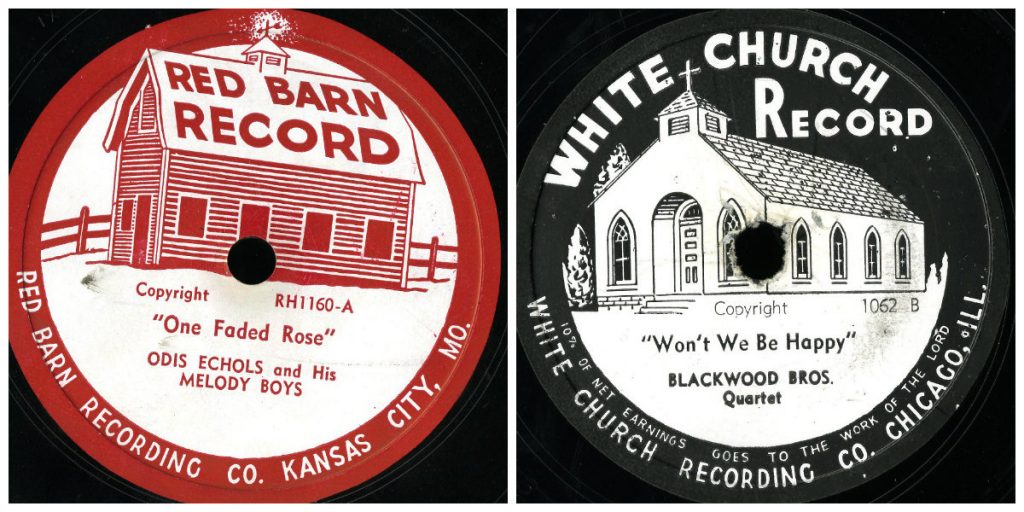
While pulling materials for a class instruction session, we came across these two strikingingly similar labels on 78s. Interested to know more, we did some research and found both labels were founded in the late 1940s in Chicago by former hillbilly comic Delbert “Deb” Dyer (for more details, see the always informative Hillbilly Researcher). He soon moved White Church offices from Chicago to Kansas in 1947 and eventually moved Red Barn there as well.
Odis “Pops” Echols was an original member of the original Stamps Quartet (aka Stamps Melody Boys), one of many white-gospel quartets supported by the Stamps-Baxter Music and Printing Company based in Dallas, Texas. His career took him across the country many times, from Chatanooga to Lubbock, Little Rock, Louisville, Los Angeles, and eventually Clovis, New Mexico. He formed many different iterations of the “Melody Boys,” including the one featured on the Red Barn record above which performed a mix of western music and gospel tunes.
The Blackwood Brothers remain a hugely popular gospel singing group. The original quartet was founded in Choctaw, Mississippi in 1934 by brothers Doyle Blackwood, James Blackwood, Roy Blackwood and his son, R. W. Blackwood. Like the Melody Boys, the Blackwood Brothers were affiliated with Stamps-Baxter and were featured on the radio out of Shenendoah, Iowa in the 1940s when they began recording for Dyer’s White Church label. With their post-WWII careers taking off, the Blackwoods left White Church and founded their own Blackwood Brothers label in 1948.
Dyer left White Church in 1949, but remained active with Red Barn until at least 1952. For a sample of the Red Barn / White Church sound, listen to Odis Echols and his Melody Boys from 78_11457 and the Blackwood Brothers from 78_14323 below.
78_11457_1_Odis Echols and his Melody Boys
78_14323_1, Blackwood Bros. Quartet, “Won’t We Be Happy” Southern Folklife Collection, The Wilson Library, UNC Chapel Hill
Have you heard the "Rain Song"?
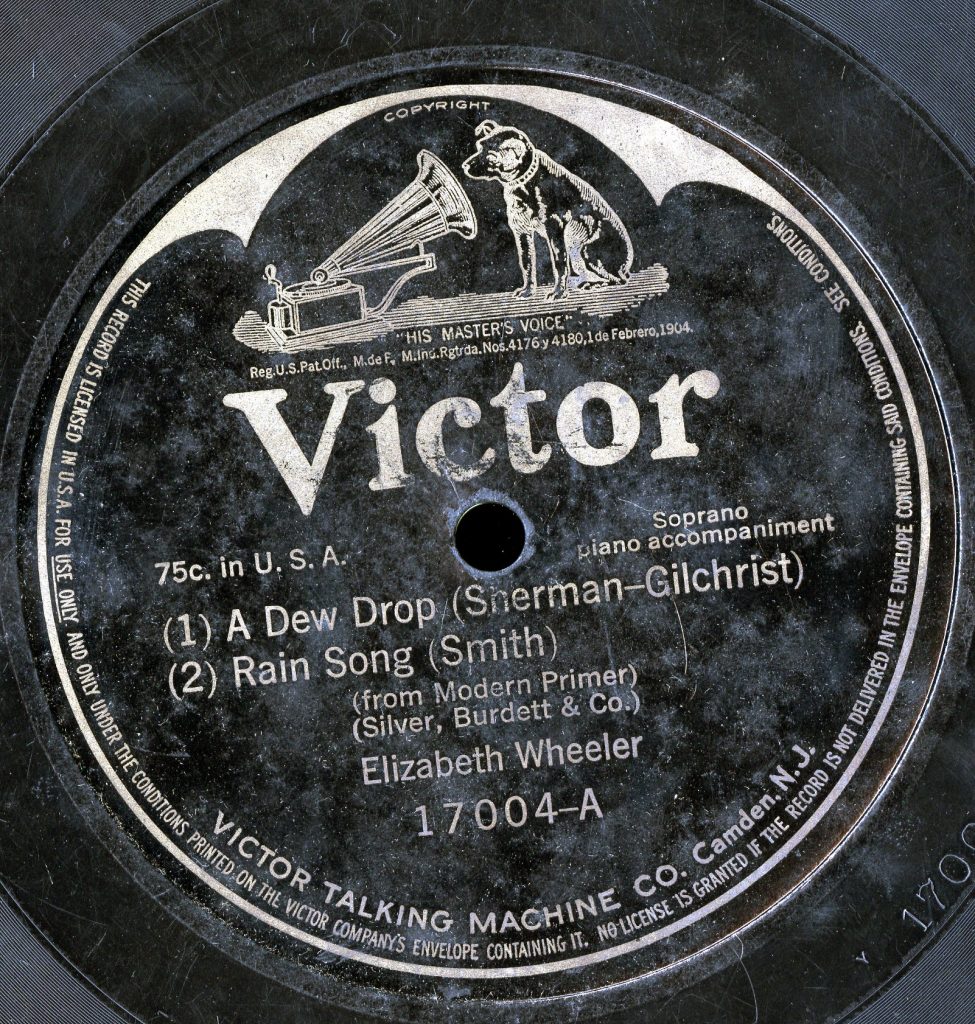
Fellow inhabitants of the Southeast United States will be listening to the rain for a few more days now, and with the potential flooding, danger and damage that are likely to follow, the pitter patter of raindrops is not the most welcome of sounds. On this soggy day, we picked out one of the earliest recorded rain songs we could find issued on 78 rpm. Issued in 1911 by Victor Recording Co. and performed by soprano Elizabeh Wheeler, this “Rain Song” was part of the curriculum for first, second, and third grades, as outlined in the Modern Primer published by Silver, Burdett, & Co. in the early 20th century. Mrs. Wheeler’s affection for rain as expressed in the song are likely not widely shared by North and South Carolinians at this time, but perhaps it may serve as a brief respite from the deluge.78_16182
Elizabeth Wheeler was a vocal instructor and recording artist who appears on over 180 sides recorded for Victor as a solo artist, in a duet with her husband Wlliam Wheeler, and with the Victor Light Opera Company. This particular 78 rpm disc, call number 78-16182 , stood out because it also features a locked groove between the “A Dew Drop” and “Rain Song” on the A-side. If you would like to hear more rain songs, feel free to make a request. See the UNC Library Catalog here for a list.
Cataloger's Corner: Stuart Hamblen for President
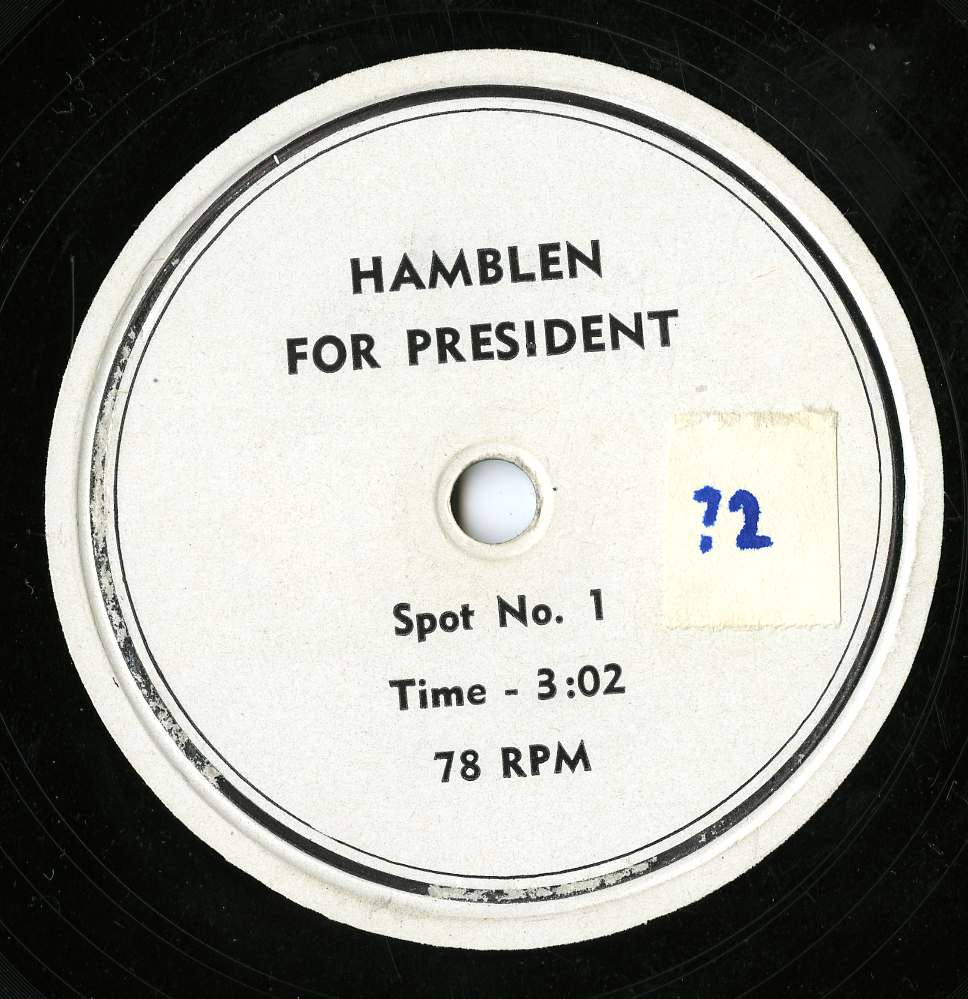
Stuart Hamblen is known today as a singing cowboy who produced radio programs such as “Covered Wagon Jubilee” and eventually “Cowboy Church of the Air.” He was also a major songwriter and recording star—one of the first C&W artists to record for Decca.
A Texas native, Hamblen moved to Los Angeles in the 1920s to start a career in radio. After a brief stint performing with the Beverly Hillbillies, he began hosting his own show. He also began making headlines for his drinking, gambling, and debt-related lawsuits, as well as for owning and training hunting dogs and racehorses. (Incidentally, he was the first person to send a horse to a race on an airplane–Flying Tiger was the name of the airline).
In 1938, Hamblen became one of a series of C&W celebrity-politicians when he ran as a Democrat for congressman of L.A.’s 11th district. (Other examples included W. Lee O’Daniel who served as governor of Texas, Jimmy Davis who served as governor of Louisiana, and Roy Acuff who ran for governor of Tennessee). Hamblen’s candidacy apparently disturbed many Democrats from his district, largely because he campaigned in character, incorporating his guitar and cowboy persona. One Los Angeles Times article referred to him as the “Bourbon candidate for Congress.” Not surprisingly, he did not win.
A decade later, in 1949, Hamblen attended one of evangelist Billy Graham’s tent meetings in Los Angeles—the meeting inspired him to quit drinking and to devote his life to the Christian faith. When his radio station KMTR subsequently asked him to promote a beer brand on air, he refused and lost his show. The beer ad incident put Hamblen on the radar of the Prohibition Party; after General Douglas MacArthur refused the invitation to run as the 1952 Prohibition presidential candidate, Hamblen was recruited for the role. With a retired professor (Enoch A. Holtwick) as a running mate, Hamblen came in 4th place, with 73,412 popular votes.
At the Prohibition Party’s convention, Hamblen played his hit song “It Is No Secret (What God Can Do),” treating it as the theme song of the campaign. At some point during 1951-1952, he used the song as well in a 78rpm recording (likely intended for radio play), entitled “Hamblen for President.” On each side, Hamblen explains his platform and emphasizes that prohibition would not be reinstated if he were elected. A few excerpts from both sides are below.
Hamblen for President, Spot 1
Hamblen for President, Spot 2, beginning
Hamblen for President, Spot 2, middle
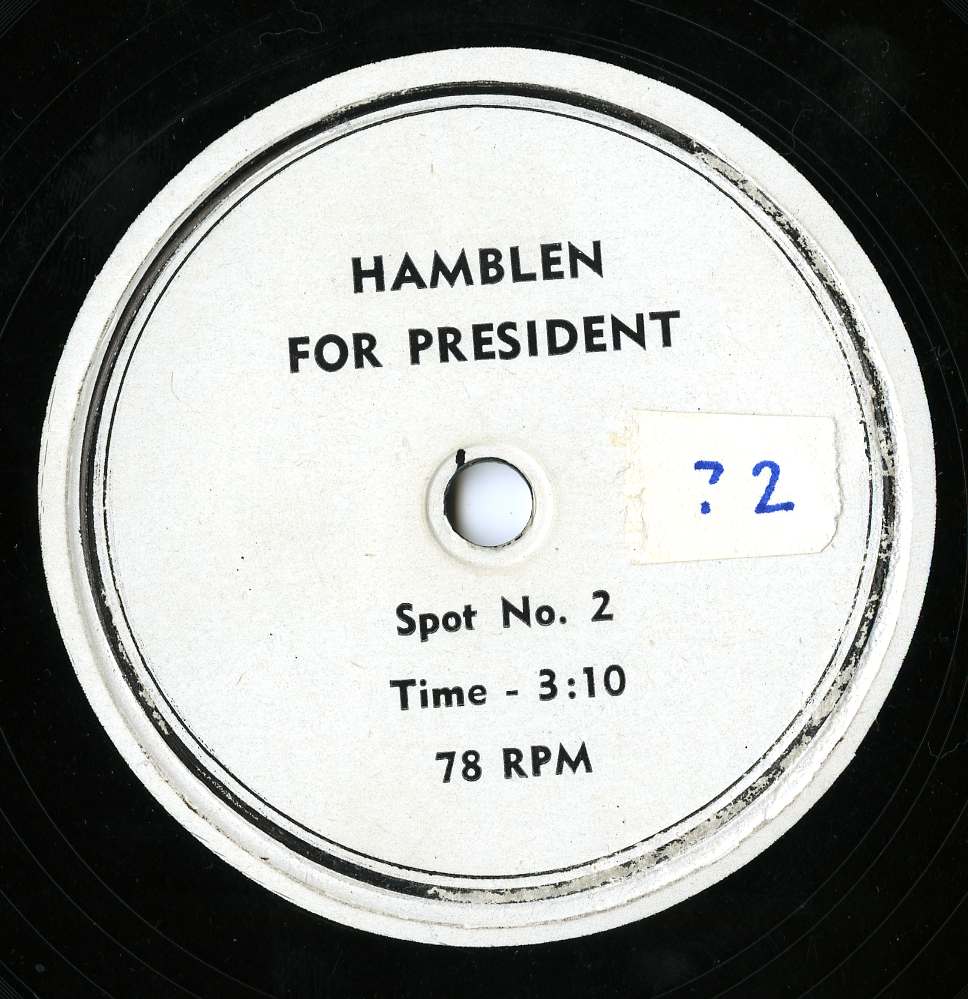
The recording is cataloged and available at the Southern Folklife Collection as 78-17711, along with many of Hamblen’s commercial recordings and reel-to-reel tapes of his radio show “Cowboy Church of the Air.”
Songs from Limestone Country
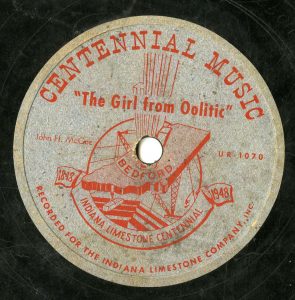
We came across an interesting bit of American industrial history in a recent 78rpm cataloging session in the Southern Folklife Collection: a circa 1948 record promoting the Indiana Limestone Company, featuring on its label a relatively complex illustration of the limestone mining process. Celebrating the 100th anniversary of Indiana’s limestone industry, it includes two songs honoring the state’s favorite sedimentary rock : “Old Limestone Quarry” and “Girl from Oolitic.” (Oolitic is a town in Indiana known for its oolite, a kind of limestone).
We cannot find any information on this release, except that John H. McGee applied for copyright for the two songs in 1949.
We’ve included an excerpt from Side A here, which features an unknown vocalist and big band:
“Old Limestone Quarry”
The record is available at the SFC as call no. 78-17816.
